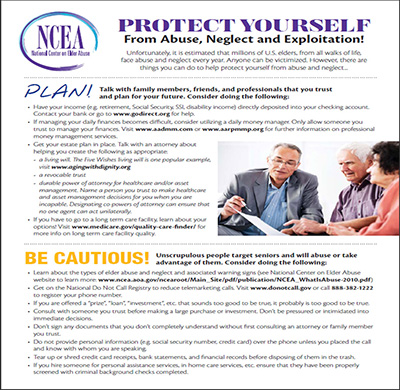 |
|
Protect Yourself From Abuse, Neglect and Exploitation!
Unfortunately, it is estimated that millions of U.S. elders, from all walks of life, face abuse and neglect every year. Anyone can be victimized. However, there are things you can do to help protect yourself from abuse and neglect...
PLAN AHEAD
Talk with family members, friends, and professionals that you trust and plan for your future. Consider doing the following:
- Have your income (e.g. retirement, Social Security, SSI, disability income) directly deposited into your checking account.
- Contact your bank or go to www.godirect.org for help.
- If managing your daily finances becomes difficult, consider utilizing a daily money manager. Only allow someone you trust to manage your finances. Visit www.aadmm.com or www.aarpmmp.org for further information on professional money management services.
- Get your estate plan in place. Talk with an attorney about helping you create the following as appropriate:
- a living will. The Five Wishes living will is one popular example,visit www.agingwithdignity.org
- a revocable trust
- durable power of attorney for healthcare and/or asset management. Name a person you trust to make healthcare and asset management decisions for you when you are incapable. Designating co-powers of attorney can ensure that no one agent can act unilaterally.
- If you have to go to a long term care facility, learn about your options! Visit www.medicare.gov/quality-care-finder/ for more info on long term care facility quality.
BE CAUTIOUS
Unscrupulous people target seniors and will abuse or take advantage of them. Consider doing the following:
- Learn about the types of elder abuse and neglect and associated warning signs (see Red Flags of Abuse)
- Get on the National Do Not Call Registry to reduce telemarketing calls. Visit www.donotcall.gov or call 888-382-1222 to register your phone number.
- If you are offered a “prize”, “loan”, “investment”, etc. that sounds too good to be true, it probably is too good to be true.
- Consult with someone you trust before making a large purchase or investment. Don’t be pressured or intimidated into immediate decisions.
- Don’t sign any documents that you don’t completely understand without first consulting an attorney or family member you trust.
- Do not provide personal information (e.g. social security number, credit card) over the phone unless you placed the call and know with whom you are speaking.
- Tear up or shred credit card receipts, bank statements, and financial records before disposing of them in the trash.
- If you hire someone for personal assistance services, in home care services, etc. ensure that they have been properly screened with criminal background checks completed.
STAY CONNECTED
Keep in touch regularly with others, isolation can make you vulnerable to abuse. Consider doing the following:
- Build a network of family, friends, neighbors, and groups that you can interact with
- Keep active, stay busy! Get involved with your senior center or other groups
- Create a buddy system with other elders, call each other daily for reassurance and friendship and visit each other if possible.
REPORT
Making a report in instances of abuse or neglect is the right thing to do, and it’s easy. Don’t be afraid! Elders have a right to be safe!
- In cases of immediate danger, call 911.
If you or others experience abuse or neglect in a community setting:
- Adult Protective Services (APS) is there to help. The APS mission is to ensure the safety and well-being of elders and dependent adults. To learn more about APS visit: www.napsa-now.org/get-help.
If you or others experience abuse or neglect in a long term care facility (e.g. nursing home, assisted living facility):
- The Long Term Care Ombudsman Program is there to help. The program’s mission is to advocate for residents in long term care facilities to help ensure safe, appropriate care. To learn more about the ombudsman program visit: www.ltcombudsman.org
LEARN MORE
- Call Eldercare Locator at 1-800-677-1116 or visit the website at https://eldercare.acl.gov/Public/Index.aspx for your local reporting phone numbers.
- You may also visit the National Center on Elder Abuse website at: https://ncea.acl.gov/Resources/State.aspx to get state by state reporting information.
- Eldercare Locator and National Center on Elder Abuse created a "Protect Your Pocketbook: Tips to Avoid Financial Exploitation" brochure for campaign to prevent financial abuse of older adults. Download the "Protect Your Pocketbook" PDF
